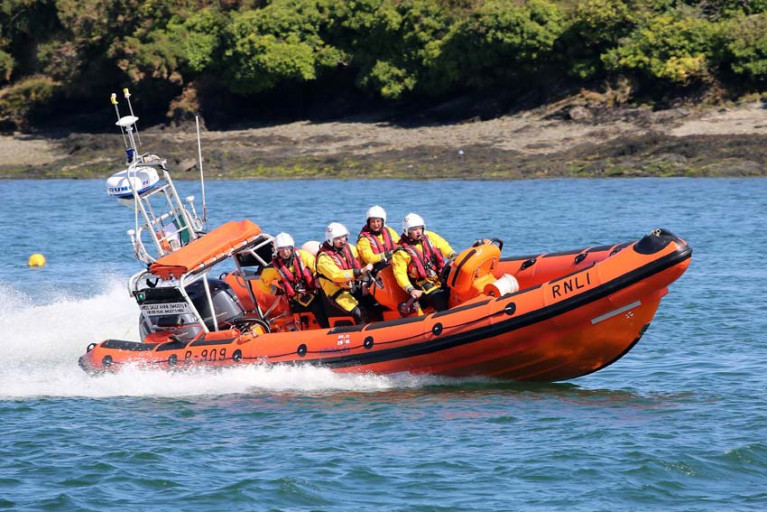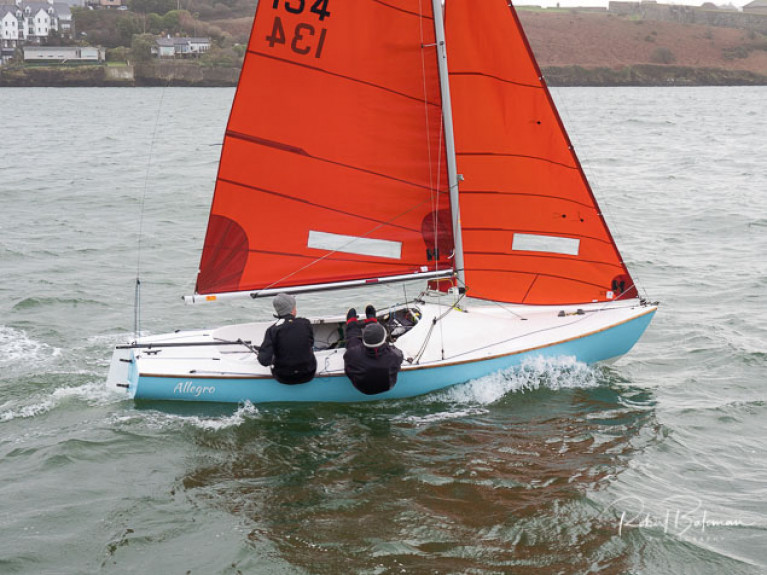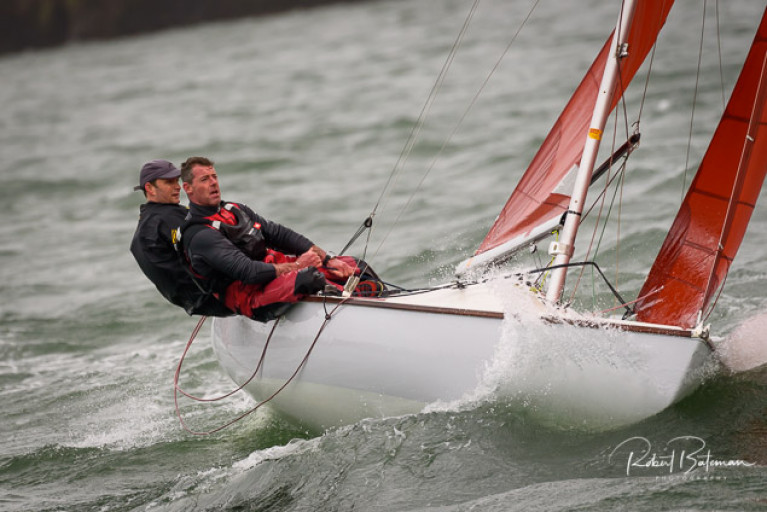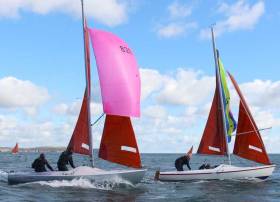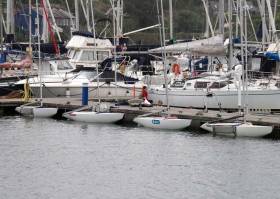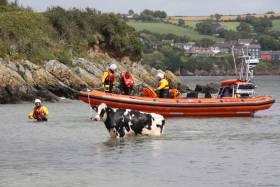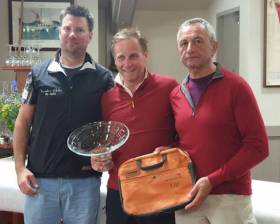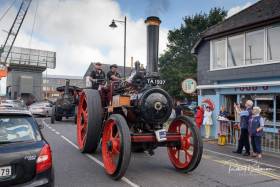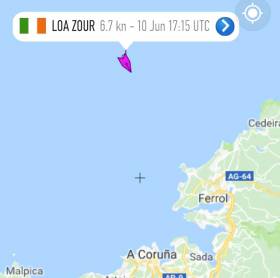Displaying items by tag: Kinsale
A motorboat with four on board which was overcome by poor weather was towed to safety by Kinsale RNLI volunteers this past week.
The inshore lifeboat Miss Sally Anne Baggy II was requested to launch shortly after 11.30am on Wednesday (8 July) to assist the 16ft motor boat off Barry’s Head, near Nohoval.
All four on board the vessel were found to be unharmed, and their boat was taken under tow to the safety of Kinsale Marina.
This marked the first rescue for the Kinsale lifeboat crew under the new RNLI coronavirus protocol, with the crew wearing protective masks and gloves in addition to the standard PPE.
Lifeboat helm Jonathan Connor said: “The RNLI remains on call throughout the Covid-19 pandemic. When we go on a callout, we don’t know the level of assistance required, or the proximity we will have to the people we are going to help.
“Safety is always paramount in our minds and wearing the full PPE and following strict RNLI guidelines minimises the risk of exposure for both our volunteer crew and those we rescue.
“The people onboard this boat did exactly the right thing by calling for assistance. If any member of the public gets into difficulty on the water or spots someone else in difficulty, they should call 112 or 999 immediately and ask for the coastguard.”
Shortly after their return to station, the crew were requested to launch for a second time to assist a 30ft vessel that had lost steerage at the mouth of the harbour.
But the lifeboat was stood down en route when the crew onboard managed to right the craft and make their own way to safety.
Kinsale Squib Nationals is Cancelled in June
The Squib National Championships 2020 scheduled for 21 - 26 June at Kinsale Yacht Club has been cancelled.
Regatta Director, Ruth Ennis told Afloat: 'The Squib 2020 Organising Committee in conjunction with Kinsale Yacht Club and the N.S.O.A. reluctantly made this decision in light of the COVID-19 pandemic'.
The prospect of the championships going ahead was discussed as recently as this week by Tom MacSweeney on Afloat here.
Ennis says Kinsale is looking at the 'possibility and logistics of hosting the event in Kinsale Yacht Club next year 2021'. All registration fees to the event will be refunded.
Kinsale Yacht Club Remains Committed to Squib Nationals
A “squib” I was told when first shown one of these boats by its owner, is “an explosive boat.
Several of them were riding nicely on the rippling water at Kinsale Marina that day two years ago when it was announced that Kinsale Yacht Club would be the location for a joint event bonding the Irish and Uk fleets in both their national championships together, then to be held in two years’ time.
“Explosive in performance, challenging and fast .. a great boat to sail,” I was told. That was back in 2018 and the Squib owner was making the point that they would be every bit as important to Kinsale as cruisers, “a major part of the club’s sailing fleet.”
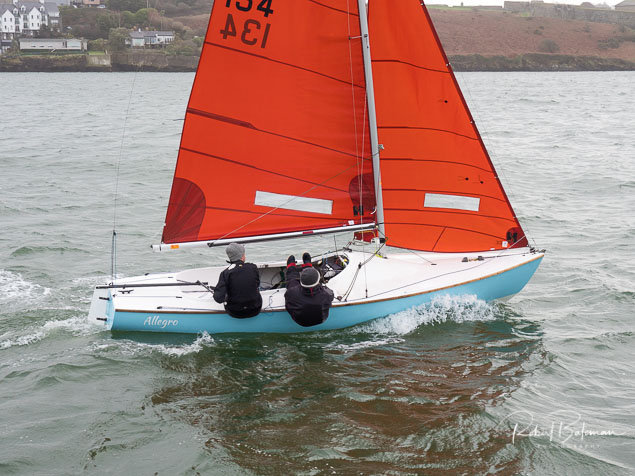 Above and Below: Local Squib duo Colm Dunne and Rob Gill sailing in Kinsale Harbour Photo: Bob Bateman
Above and Below: Local Squib duo Colm Dunne and Rob Gill sailing in Kinsale Harbour Photo: Bob Bateman
There are Squibs in the fleets of several clubs around the country and they come to my mind this week because they were the last big racing fleet on the water before the shut down of sailing. We are at the stage where there is neither physical contact with our boats in most cases, as well as social isolation in our sport and uncertainty about when it will be able to resume.
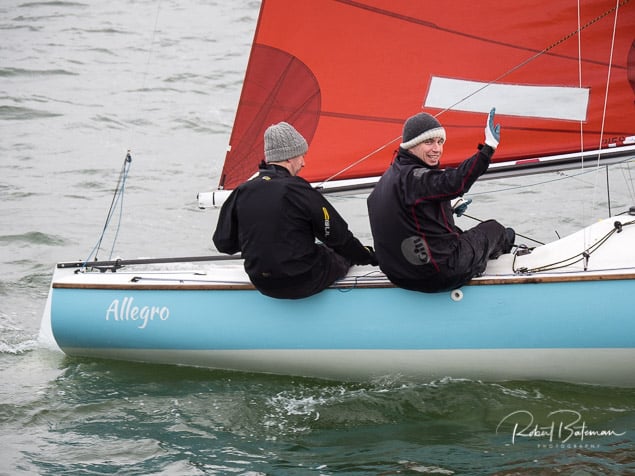
The Squib is a racing keelboat for a crew of two, designed in 1967 by Oliver Lee as a successor to the Ajax 23. It is a one-design class of 5.79 metres long and a beam of 1.87 metres. The Royal Yachting Association in the UK gave them national keelboat recognition. They have the advantage of being trailed pretty easily, according to their advocates.
One of the big tactical successes in promoting Squibs was made by the class In 1974 when, with sail numbers approaching 400, leading British yachting journalists were invited to Burnham-on-Crouch to race Squibs, in an event called the ‘Squib Symposium.
“This resulted in raising the Squib's profile with the yachting press,” says the Class. And there was an extra benefit from all that publicity! Around this time, the UK Design Council put the Squib on its index of selected designs. A pretty good recognition.
The original boat design by Oliver Lee for Hunter Boats has had changes made by the Class as interest evolved. The dinghy is credited for having led to the building of the Hunter 19, which was described as putting “a lid on the Squib.” The Squib also spawned the Sandhopper, a boat with shoal draught and triple keels of which 45 have been built and raced on the British East Coast.
The Squib National Championships and UK Championships are due to be held this Summer at Kinsale Yacht Club, scheduled for June 21-26. A lot of work has been put into the preparation of the event and now, of course, the Coronavirus Covid-19 crisis is causing a degree of concern.
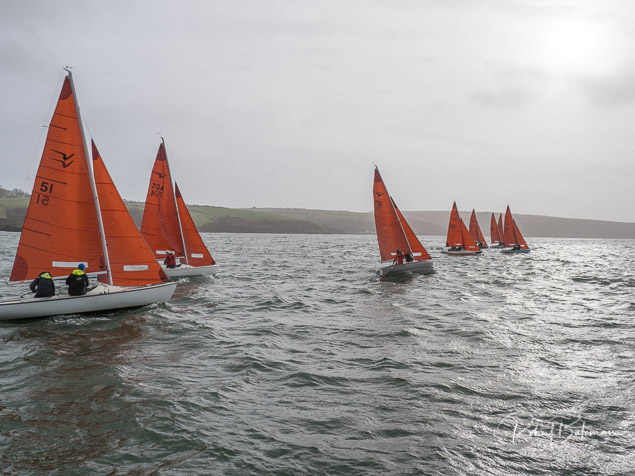 A recent Squib class start at Kinsale in February 2020 Photo: Bob Bateman
A recent Squib class start at Kinsale in February 2020 Photo: Bob Bateman
The Committee in Kinsale, led by Regatta Director Ruth Ennis, announced this weekend that it remains “committed to running the championships. We are aware that the situation regarding Covid-19 continues to evolve.” If the event must be postponed or cancelled a full refund will be available it says to those who have already entered. The club has an experienced organising team in place, building on the success of many previous large events hosted by KYC.
Custom Rigging Frostbite Series at Kinsale Yacht Club
For the record, that last competitive event before the sailing close-down was the final day of the Custom Rigging Frostbite series at Kinsale Yacht Club and it was a testing one for all competitors. Wind speeds gusted to 30 knots, averaging between 19 and 21 with gusts going from 27 to 30.
"There were eleven Squibs racing in the Series"
There were eleven Squibs racing in the Series, with sponsor Harry Lewis amongst them. Sailing with Sean O’Riordan in Longshot, the duo won third prize overall.
The series winner was Allegro raced by Colm Dunne and Rob Gill. They had seven first places and finished third across the line in two other races. Second was Outlaw, sailed by Ian Travers and Keith O’Riordan, who won two of the races in the series and had five second places. Allegro finished on 7 points, Outlaw had a total of 12 and Longshot 25 points.
The Squibs also raced under ECHO handicap, in which the final positions changed from the premier division. Under ECHO, Outlaw finished 1st, Allegro was 2nd and Sibu, sailed by Geraldine and Denis Kieran got third place.
And that explosive” comment about the performance of the boats, made by that Squib owner in Kinsale has an appropriate definition. The word “squib” is defined in dictionaries as “a small firework that burns with a hissing sound before exploding….”
Listen to the podcast below:
Prison ‘Highly Likely’ For Kinsale Outboard Motor Thieves, Judge Says
A judge at a Cork court has told two outboard motor thieves that the targeting of outboard engines for theft is a particularly disquieting crime, writes Tom MacSweeney.
At Cork Circuit Criminal Court, Judge Sean Ó Donnabháin refused to grant bail to the two men and remanded them in custody for sentencing on November 7.
He said that prison sentences were highly likely.
Giedrius Stoncius (30) and Giedrius Lukosius (33), both with addresses in Mallow, pleaded guilty to the charges of theft in Kinsale in February.
The court was told that the stolen property had been returned to the owners and money had been brought to the court to pay for damage.
The judge said that the methodology and extent of the offences suggested a professional organisation.
Gardaí had warned boat owners about thefts in February.
Kinsale 2020 Squib National Championships Registration Opens
Kinsale Yacht Club and the Kinsale Squib fleet are hosting the 2020 Squib National Championships 21st to 26th June 2020 and registration opens online on Tuesday, 1st October here
Racing will be in the waters between the Old Head of Kinsale and the Sovereign Islands with 8 races planned over 6 days.
Entrants are expected from all across the UK and Ireland with very competitive racing in the Gold, Silver and Bronze Fleets.
The Social Programme will include a number of specially themed evenings in Kinsale Yacht Club culminating in the Gala Dinner on Friday 26th June 2020.
International 2.4mR Championship is Blown Out in Kinsale
The International 2.4mR one-person keelboat Irish National Championships was cancelled this morning in Kinsale, County Cork writes Bob Bateman
It was initially postponed by Race Officer Jack Roy by one hour but after going to sea and observing the sea state in the ebb tide a further decision was taken to cancel for the day.
The 10-boat fleet will have a first gun tomorrow at 0955 with a four-race schedule.
The boat is primarily used for racing and the class holds highly competitive national events in many countries. In some countries, it features mainly as a class for sailors with a disability.
The 2.4mR is ideal for adapted sailing since the sailor does not move in the boat, and everything is adjustable from right in front of the sailor. Both hand-steering and foot-steering are possible.
Kinsale Lifeboat Gets A Little Help From Farmer To Rescue Cow From Harbour After Cliff Fall
A cow named Ghost was saved from Kinsale Harbour at the weekend after slipping down a cliff from the field above — in what also marked a second animal rescue this year for Kinsale RNLI.
Kinsale’s lifeboat volunteers launched on Saturday afternoon in Force 7 winds and choppy seas to the scene, where the year-old Holstein Friesian cow had dropped some distance and was in an agitated state, Kinsale RNLI says.
Attempts to lasso the cow from the inshore lifeboat failed as the animal panicked and resisted the lifeboat crew’s efforts.
But after bringing out the cow’s owner — local farmer Brian Hayes — to assist, they were able to fit a halter and tow Ghost back to shore.
“She’s always been hyper since she was a calf,” Hayes said back on the farm. “She’s out in the shed now drinking and eating normally, thankfully. The lads were great and I really am fierce grateful to the RNLI.”
This is the second animal rescue for the Kinsale crew in 2019. In February, they assisted a horse that had become trapped in local oyster trestles.
“While we are delighted to save animals, our primary concern is always for human life,” lifeboat helm Jonathan Connor says.
“We were eager to prevent the farmer, who was a non-swimmer, and other bystanders from entering the water and attempting the rescue themselves, and were also conscious of a number of people on the nearby beach who could have been put in danger.”
If you see anyone in danger on or near the water, dial 999 or 112 and ask for the coastguard.
Oh to be in Kinsale on a sunny Saturday with a breeze watching the wonderfully named Fagin, Outlaw, Slipstream, Allegro, Nimble and Kanaloa zipping around offshore marks battling like gladiators in Squibs for best positions at windward and leeward buoys, ducking and diving under the eagle eye of Race Officer Tony Small and his team aboard Destiny who got three races in… what a great first day reports Dave O'Sullivan.
The Championships was sponsored by Fusco Artisan, CH Marine and Mamuko.
Sunday turned out to be tougher for all with an overcast start followed by a sea mist later. Three races were once again sailed over a long day with boats finally alongside at 1600 with a crane awaiting to lift visitors ashore.
The nineteen boat fleet saw great competition with only four points separating first and fourth in the end after a discard.
Gold Fleet Results
Fagin (Royal NIYC – G. Patterson & R .Nolan) were overall winners by one point to Outlaw (Kinsale YC – I. Travers & K. O’Riordan) with Slipstream (Killyeagh YC – R. Marshall & B. Kelly) third, just ahead of Allegro (Kinsale YC – C. Dunne & F. Ward).
Silver Fleet Results
First place went to Sensation (Kinsale YC - B. & D. Cudmore) with Nebulette (Kinsale YC - M. Barry & L. Bond) second and Flora (Kinsale YC - B. Nash & D. Ross) third.
All agreed that it was a great test run for the Squib Nationals due to be held in Kinsale in late June 2020
Results here
Bells & Whistles for Sovereign's Cup Finale as RNLI Steam Engine Rally Arrives in Kinsale (Photo Gallery Here!)
If Kinsale Port wasn't treated to enough on Saturday with the climax of the 95-boat Sovereign's Cup Regatta at Kinsale Yacht Club, the West Cork Town also had a visit from the Celtic Steam Engine Association writes Bob Bateman. It evoked great memories of times past with the smell from the smoke and coal and the noise and steam from the whistles from the parade of over a dozen engines big and small through the town.
With names such as 'Leanb', 'Diane', 'Patricia' and 'Scrumpy' the preserved steam engines were participating in a three-day West Cork road run in aid of the RNLI that started on Friday, June 27 at Jacob's Bar in Baltimore.
Passing through Leap, Roscarbery and Clonakilty and Baillinspittle, the run tooted their whistles as they came past Kinsale Yacht Club at prizegiving time before finishing at the Spaniard Pub at 5 pm on Saturday to great applause.
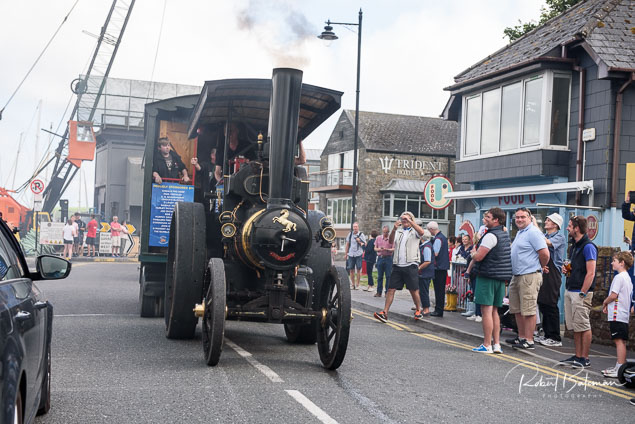
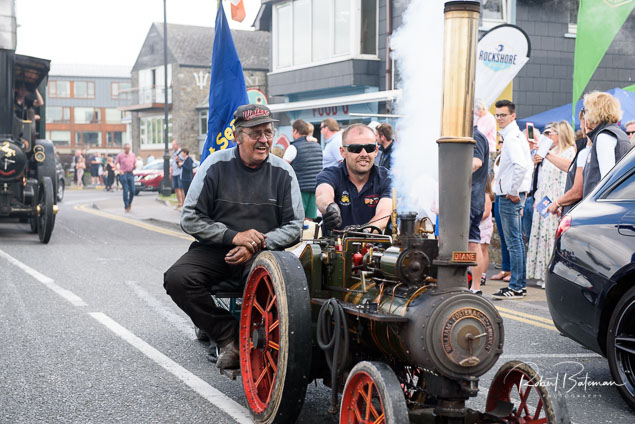
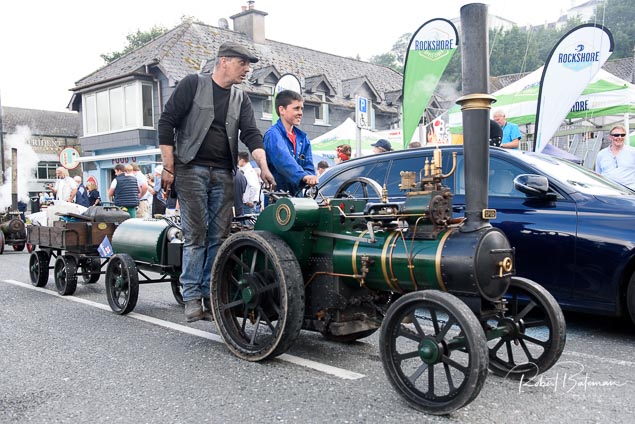
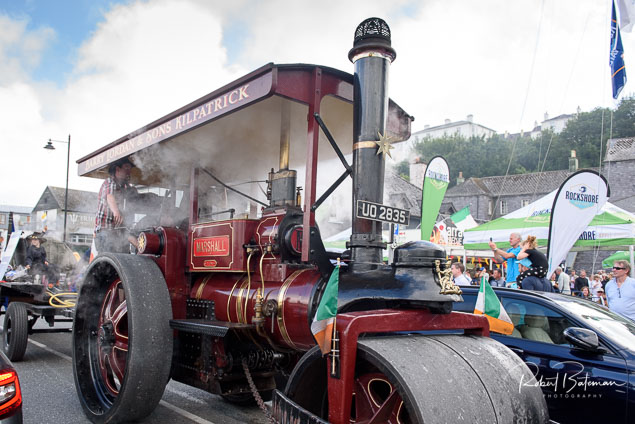
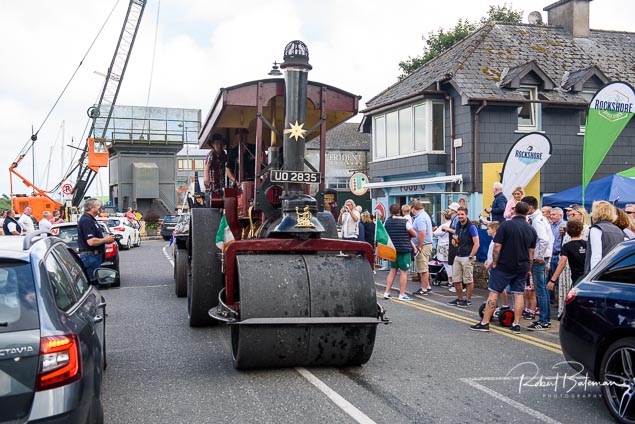
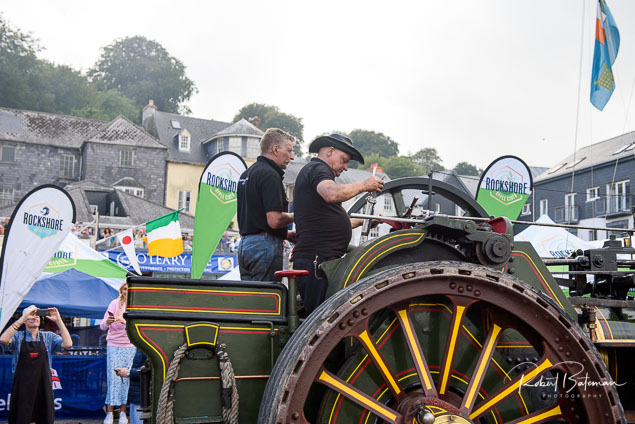
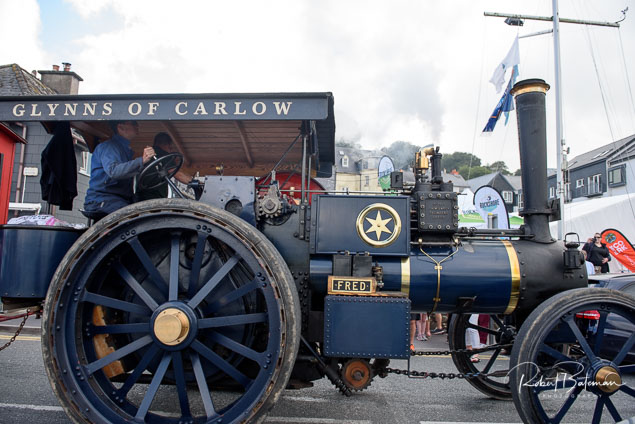
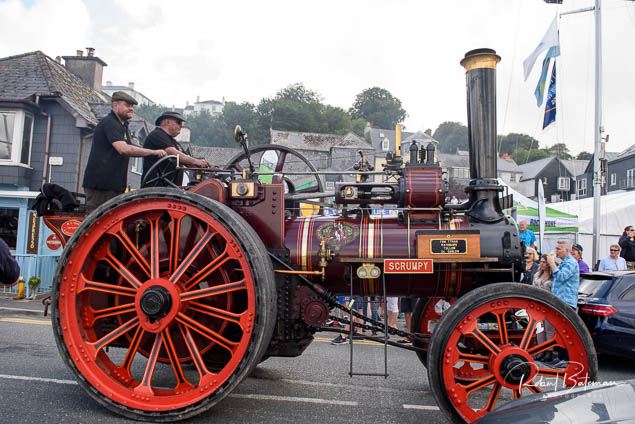
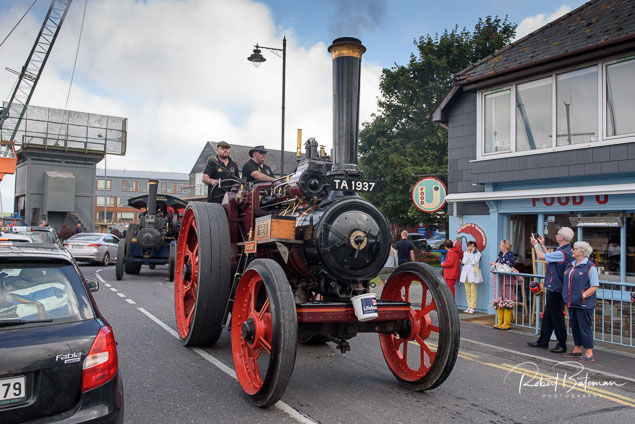
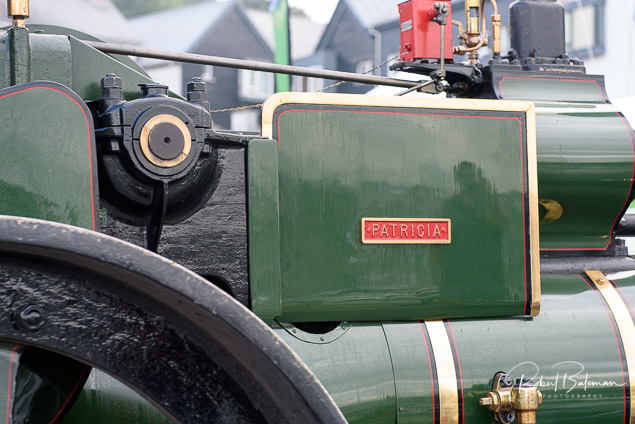
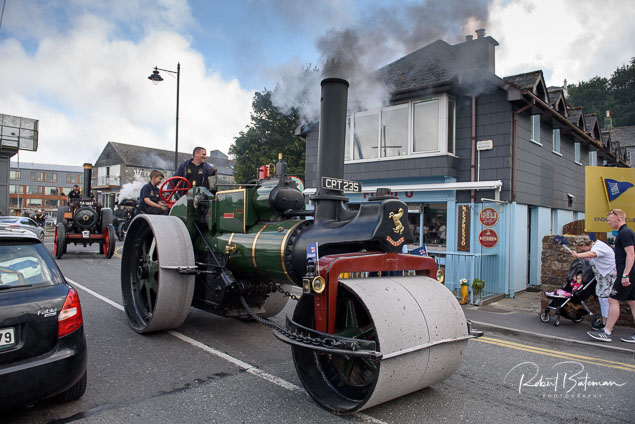
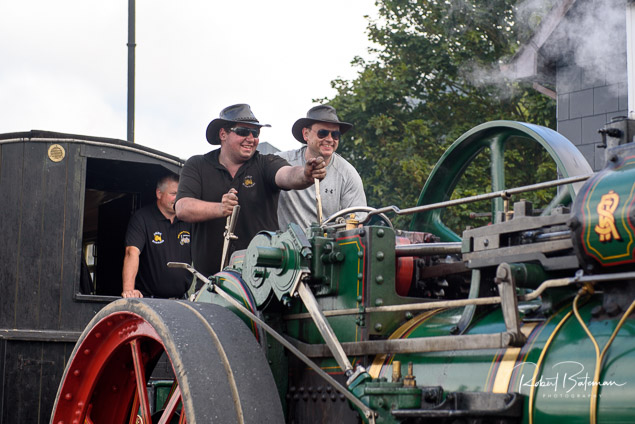
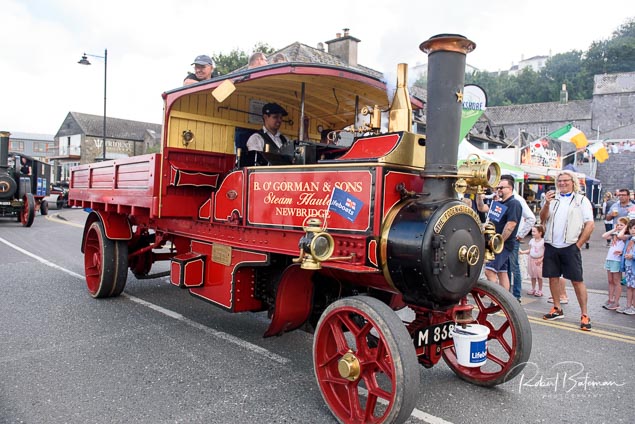
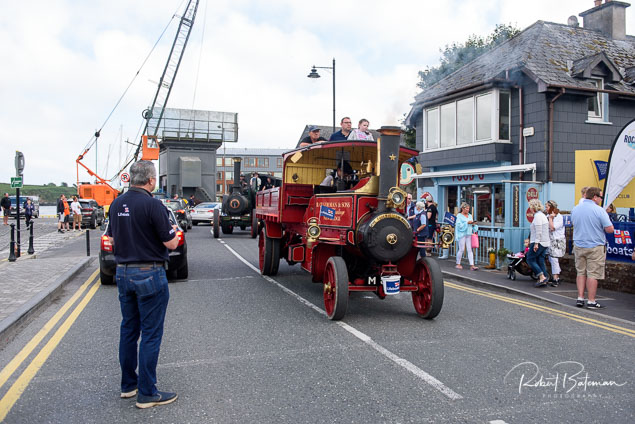
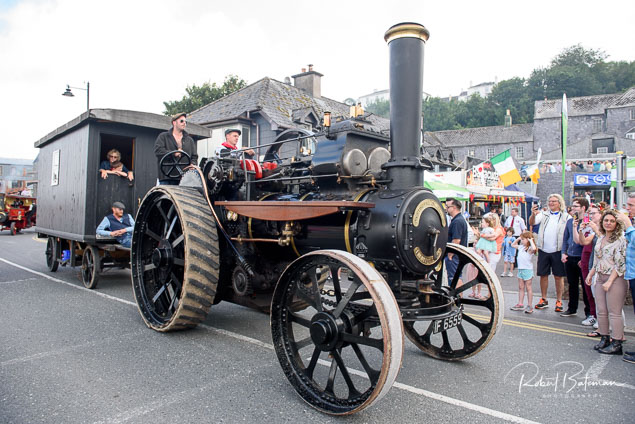
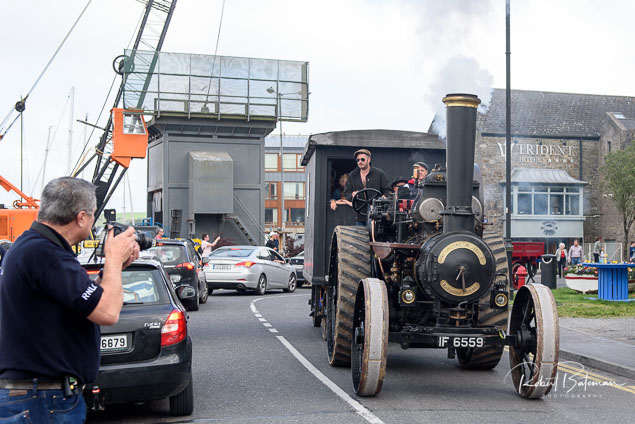
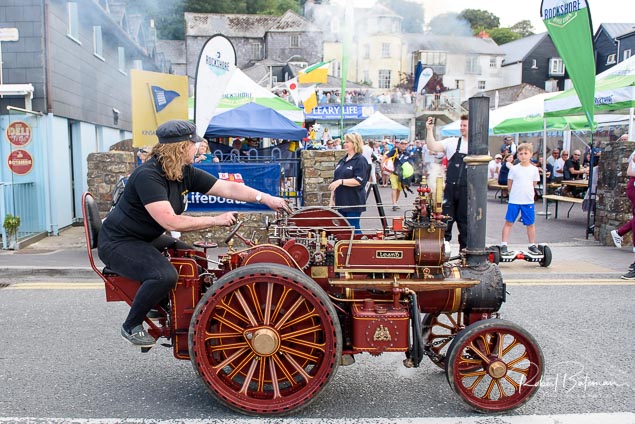
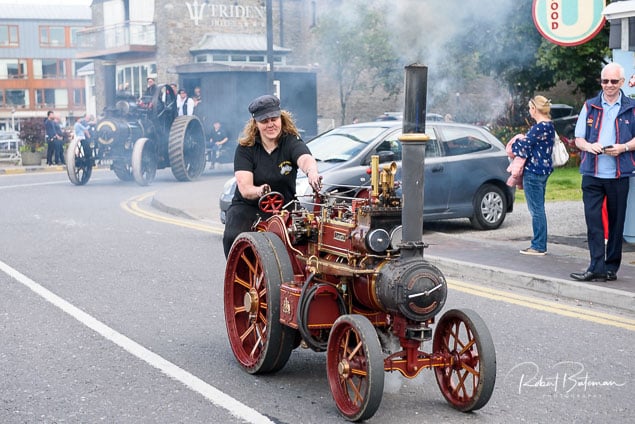
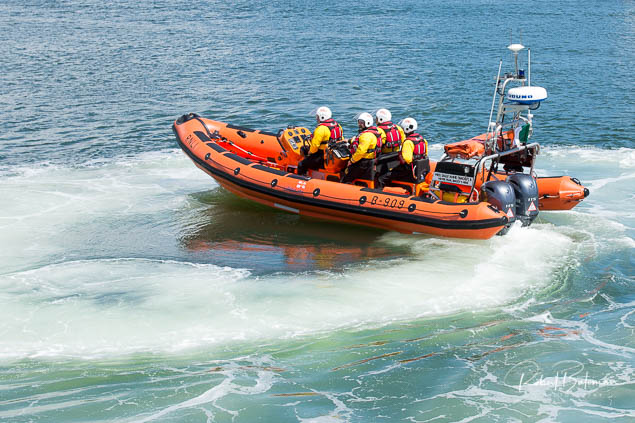 The local Kinsale RNLI lifeboat 'Miss Sally Anne (Baggy)' that bears the sign on her stern: "Never Fear Baggy’s Here" Photo: Bob Bateman
The local Kinsale RNLI lifeboat 'Miss Sally Anne (Baggy)' that bears the sign on her stern: "Never Fear Baggy’s Here" Photo: Bob Bateman
Kinsale Yacht Loa Zour Recovered By Its Crew & Heading to A Coruña Under Its Own Power
The Kinsale Yacht Club crew that were rescued from their 40-foot yacht 'Loa Zour' off the Spanish coast last Thursday have rejoined the vessel and are heading for the port of A Coruña with an ETA this evening of 2300hrs.
Afloat previously reported the crew were safe after being rescued 80 miles off the coast of northwest Spain.
Kinsale Yacht Commodore Dave O'Sullivan told Afloat this evening "the sailing vessel has been recovered by its crew and is making its way to La Coruña under its own power".
The Cork yacht 'Loa Zour', a Bavaria 40 type, under skipper Ger Grant departed Kinsale bound for A Coruña on June Bank Holiday Monday.
O'Sullivan has described the crew and skipper as 'very experienced' and that they have 'extensive cruising experience'. He also said the boat was 'very well equipped' for such a voyage.


























